For centuries, green tea has been revered for both its delicate flavor and its profound impact on health and wellness. Originating in China thousands of years ago, green tea has since spread its influence across the globe, becoming a beloved staple in countless cultures. Today, its popularity continues to soar as more people discover the multitude of benefits packed into each soothing sip, spanning everything from heart health and digestion to immunity and even mood support.
But with all the green teas available, it can be overwhelming to make a purchasing decision. As a registered dietitian and outspoken tea lover, I’m here to help! Be it bagged or loose, classic leaves or ground matcha, decaf or ultra-caffeinated, I’ve done my homework. Below are my eight favorite green teas guaranteed to *steep* up your game.
The best green teas, at a glance:
- Best overall: Numi, Gunpowder Green Tea, $6
- Best loose-leaf: Full Leaf Tea Co., Organic Sencha, $14
- Best bagged: The Republic of Tea, The People’s Green Tea, $13
- Best matcha: Naoki, First Spring Blend Ceremonial Grade Matcha, $26
- Best enhanced matcha blend: Mud/Wtr, Rise Matcha, $50
- Best budget: Bigelow, Classic Green Tea, $4
- Best splurge: Arbor Teas, Organic Jasmine Pearled Green Tea, $42
- Best decaf: Stash Teas, Decaf Premium Green Tea, $7
Health benefits of green tea
Green tea comes from the Camellia sinensis plant. This shrub’s leaves eventually grow to become not only green tea, but black, white, oolong, red, pu-erh, and yellow teas, depending on how they’re harvested and processed.
All camellia teas are rich in plant compounds, otherwise known as phytonutrients, that offer antioxidant benefits—and green tea is no exception. The drink is known to contain bioactive compounds, such as kaempferol, quercetin, catechins, and epigallocatechin gallate (EGCG), as well as the amino acid l-theanine—all of which work to reduce inflammation throughout the body and ward off disease-causing free radical molecules.
Research suggests that regularly drinking green tea may help lower cholesterol levels and decrease the risk of heart disease, thanks to its heart-healthy compounds like flavonoids and polyphenols. It’s also beloved for its brain-boosting benefits, thanks to its modest dose of caffeine (somewhere between 30 and 50 milligrams per eight ounces, which is about half the amount in a cup of coffee.) Green tea’s caffeine content promotes alertness, focus, and stamina without the dreaded crash associated with coffee.
How to choose the best green tea
Before getting into specific brands, there are a few things to look for when perusing the tea aisle—namely certification seals. Certifications show that the tea brand has voluntarily undergone third-party verification for specific standards, illustrating their dedication to purity, quality, and other initiatives. Here are the top certification seals I look for on tea packaging:
Fair Trade: The Fair Trade Certified seal shows that the brand is committed to improved worker conditions, fair compensation, and environmental protections through rigorous standards.
Organic: USDA Certified Organic is always a bonus when shopping for tea as it guarantees that the product was made without synthetic pesticides, fertilizers, or other chemicals. Regenerative Organic Certified is even better as it incorporates all the benefits of organic farming with added requirements for animal welfare and labor standards.
B Corporation: A final certification that’s great to see on packaging is the B Corp seal, signaling that the brand is committed to sustainability through social and environmental initiatives.
Outside of these certifications, I also like to check the origin of the tea leaves. With green tea (that isn’t part of a blend), you want to see that the leaves have been harvested from a single region. This typically indicates that the tea is of higher quality, though there are always exceptions, of course.
8 best green teas, according to an RD
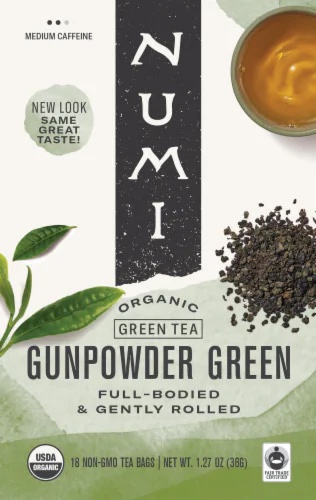
Best overall: Numi, Gunpowder Green Tea — $6.00
Servings: 18 bags
In my opinion, Numi’s Gunpowder Green Tea is the perfect all around green tea. This is because it can be readily found in many grocery stores, is not overly expensive, sports USDA Organic and Fair Trade certification, is bagged for convenient use, and offers true green tea flavor. As a green tea fan, I appreciate a smooth, full-bodied, nutty flavor and Numi certainly offers that with this variety. Plus, it still contains all the health benefits and caffeine you want in a green tea.
- Organic and Fair Trade certified
- Bagged for convenience
- Easy to find in most mainstream retailers
- Affordable
- Flavor may be too robust for some
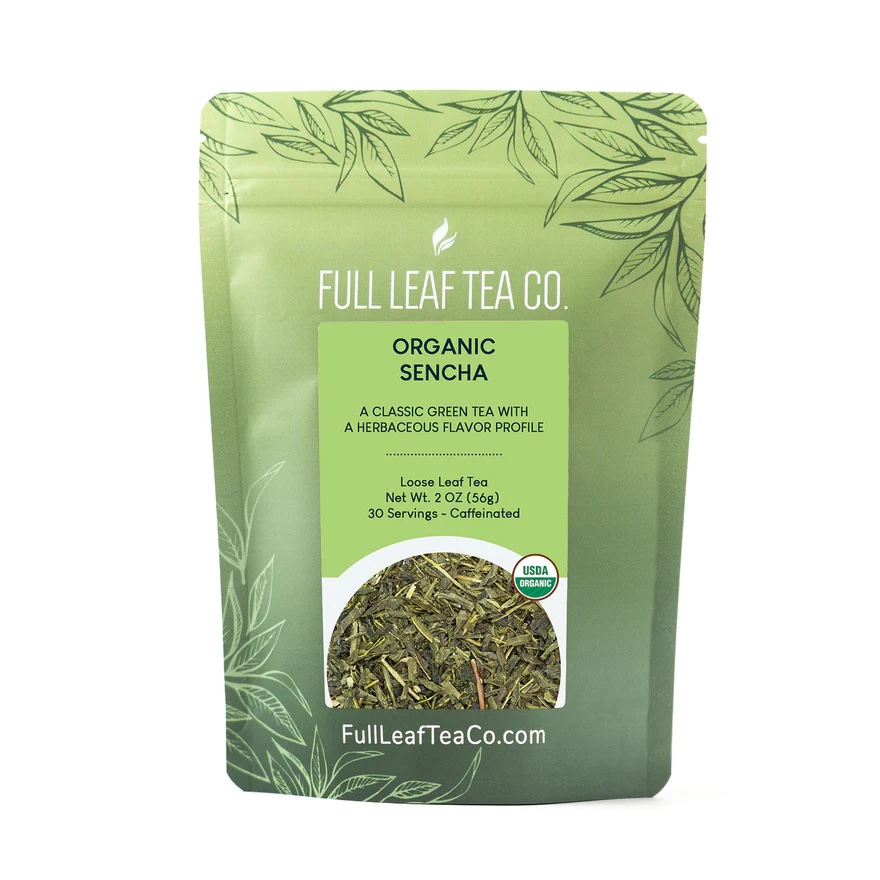
Best loose-leaf: Full Leaf Tea Co., Organic Sencha — $13.00
Servings: 30
Loose-leaf teas are ideal for a cozy day at home with nowhere to be. Because you, the drinker, measure out how much you want in a serving, they can be brewed as strong or as weak as you’d like in both flavor and caffeine content.
Many of the highest-quality teas tend to be loose-leaf, and Full Leaf Tea Company’s Organic Sencha is no exception. Sencha is a variety of traditional Chinese green tea where the leaves are steamed before packaging resulting in a more delicate, yet vibrant floral flavor. This 2-ounce bag contains thirty servings, giving you a month’s worth of tea (if you drink it every day), tastes great, and won’t break the bank—it’s $13 a bag.
- Organic
- No tea bags or overwraps yield less waste and a customizable cup
- Affordable
- Tastes great
- Requires a tea ball or disposable tea bag to brew
- Not readily available in most grocery stores
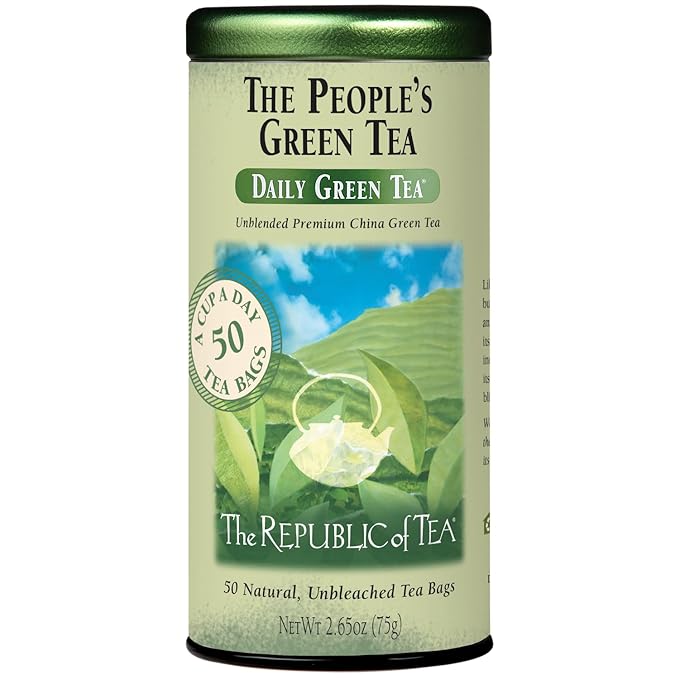
Best bagged: The Republic of Tea, The People’s Green Tea — $13.00
Servings: 50 bags
The Republic of Tea is well-known for offering a variety of tea blends that are readily accessible, thanks to placement in grocery stores across the nation. At an affordable price point, its green tea bags are perfect for everyday drinking with a mild, approachable flavor. This forgiving tea is perfect for the new green tea drinker as it can be steeped with boiling water without turning bitter (the most delicate green teas should be steeped with water that hasn’t yet boiled).
- Conveniently bagged for on-the-go drinking
- Smooth, light flavor that won’t turn bitter
- Affordable
- Easy to find in most mainstream retailers
- Not organic or Fair Trade certified
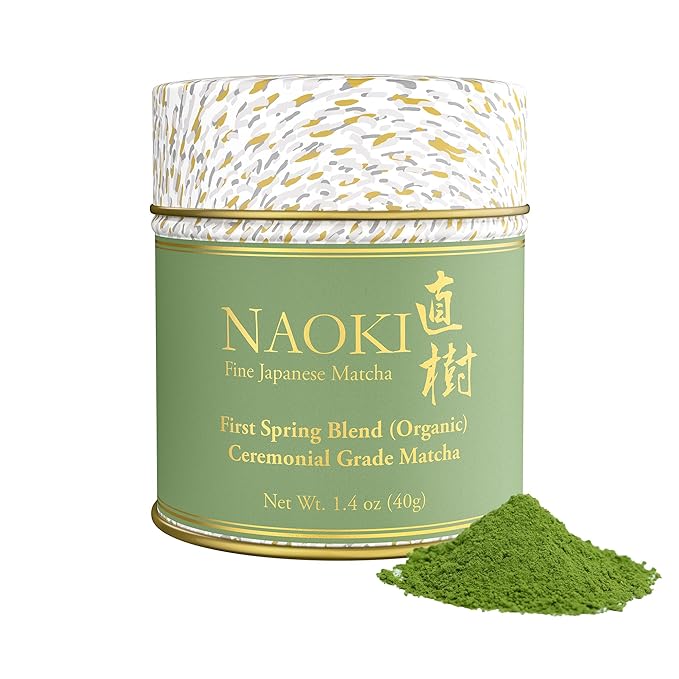
Best matcha: Naoki, First Spring Blend Ceremonial Grade Matcha — $26.00
Servings: 20
No green tea roundup would be complete without a matcha option (or two), and Naoki’s Ceremonial Grade Matcha is more than worth the recognition thanks to its high quality and delicious taste. This is a great beginner’s matcha as it upholds its tasty, vegetal flavor without turning bitter—perfect for lattes, baked goods, and smoothies.
- Great price for the quality
- Tastes great
- Intentionally sourced from a handful of regions in Japan
- Versatile
- Not readily available in most grocery stores
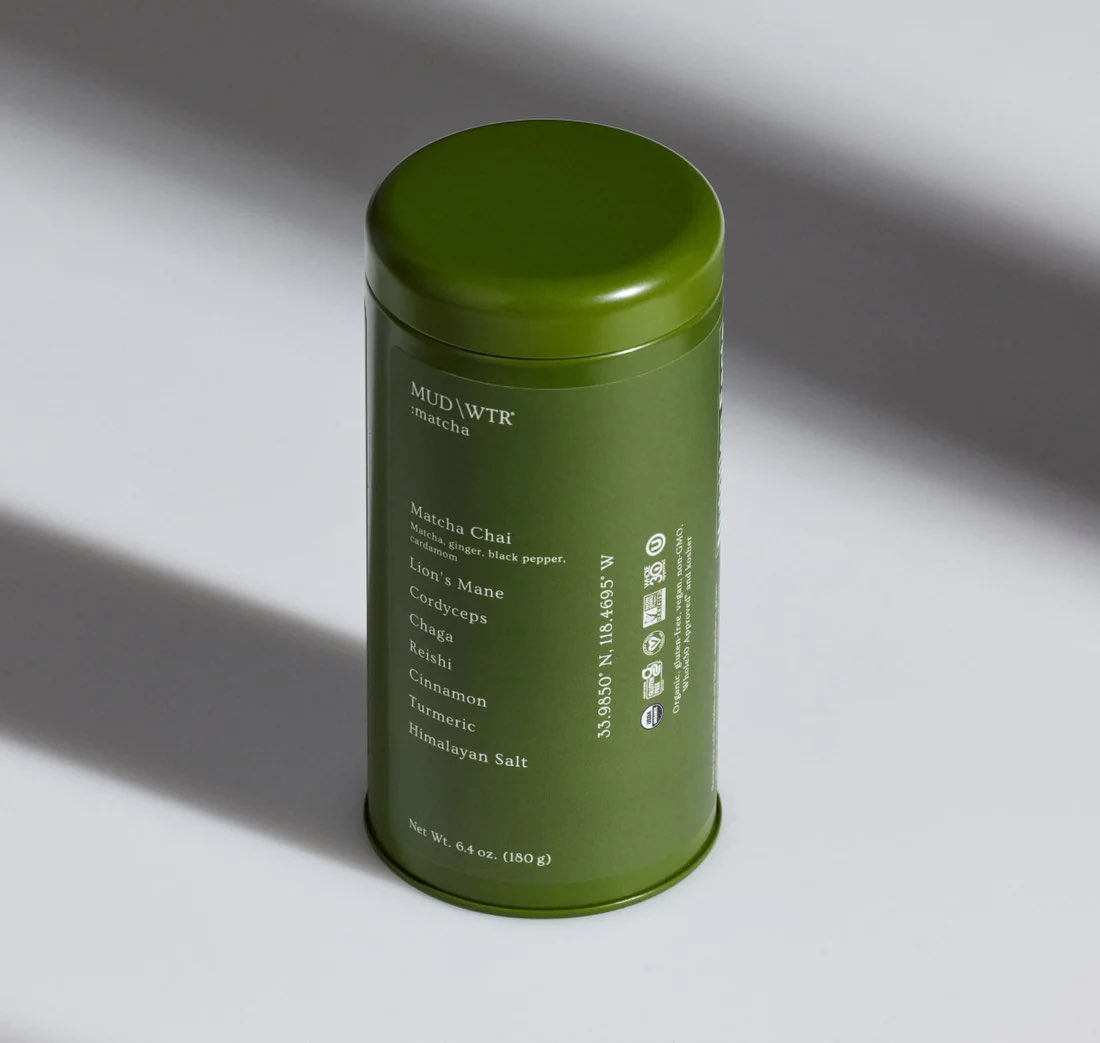
Best enhanced matcha blend: Mud/Wtr, Rise Matcha — $50.00
Servings: 30
With the popularity of matcha has come a handful of creative matcha blends, including MUD/WTR’s Matcha. This matcha is a little more reminiscent of chai in flavor than matcha thanks to the black pepper, turmeric, cinnamon, ginger, and cardamom it contains. It also features adaptogenic mushrooms, like reishi, lion’s mane, chaga, and cordyceps. These nutrient-dense additions pack a serious antioxidant punch, increasing the healthfulness of your matcha while offering longer-lasting energy.
- USDA organic
- Blended with superfoods for additional benefits
- Unique flavor that’s perfect for switching up your routine
- Expensive
- Not readily available in most grocery stores
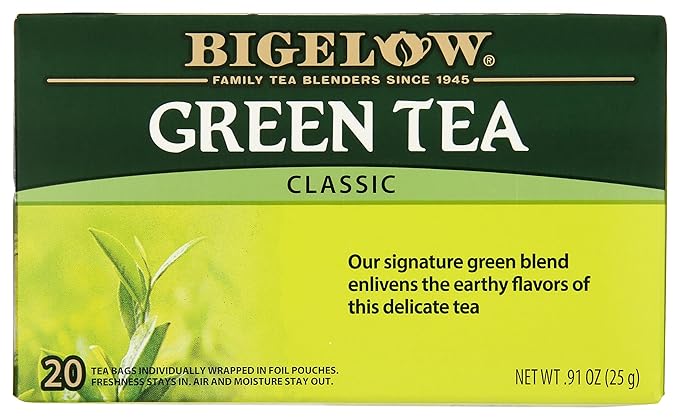
Best budget: Bigelow, Classic Green Tea — $4.00
Servings: 20 bags
Odds are that you’ve seen (or already have) a variety or two of Bigelow’s teas. This is thanks to its wide availability nationwide, trusted quality, and affordable price point. Its green tea meets all these criteria and offers a delicate, earthy taste. And while Bigelow doesn’t sport organic or Fair Trade seals, it is a certified B corporation—a great bonus.
- Certified B Corp
- Affordable
- Bagged for convenience
- Easy to find in most mainstream retailers
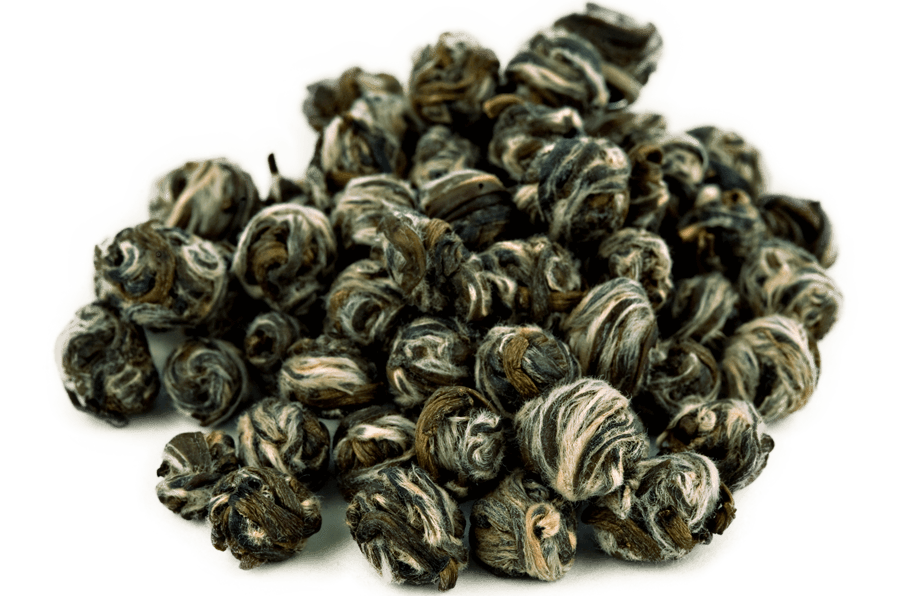
Best splurge: Arbor Teas, Organic Jasmine Pearled Green Tea — $42.00
Servings: 63
If you’re a tea connoisseur like myself, then you might know about tea pearls. These hand-rolled pearls unfurl into a beautiful floral display in your mug as they steep, sure to impress company when you have a high tea. But this tea is not only for display—it imparts the most lovely subtle jasmine flavor and aroma, too!
- Organic and Fair Trade-certified
- Grown and harvested by the Miao farmers of Xinmin Village, China
- Beautiful display tea
- Tastes and smells delicious
- Expensive
- Not the best variety for steeping the same leaves multiple times
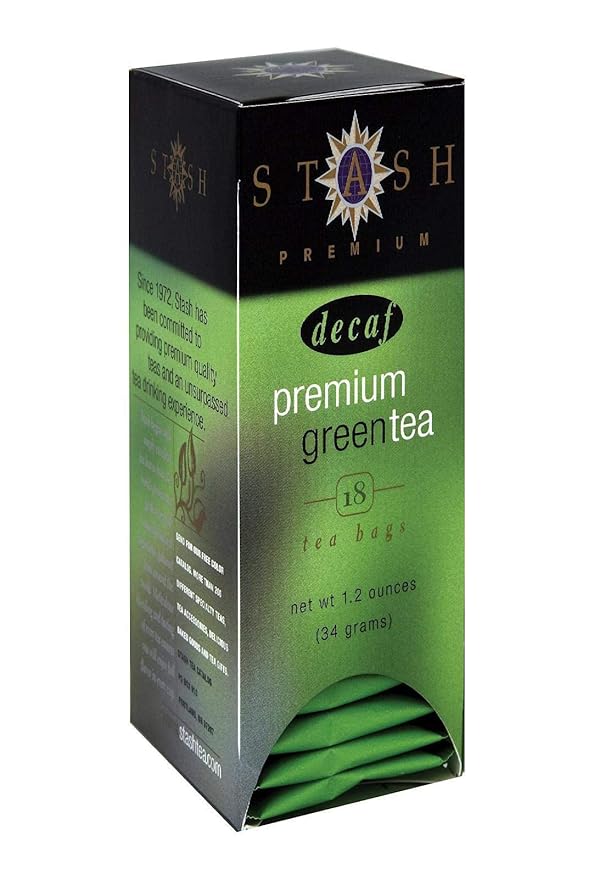
Best decaf: Stash Tea, Decaf Premium Green Tea — $7.00
Servings: 18 bags
While many drink green tea for a crash-free energy boost, others want all the health benefits without the caffeine (and can even be drank for sleep). This is where a tasty decaf variety, like Stash’s Premium Green Decaf Tea, can fit perfectly. This mild, nutty tea brews to a beautiful golden color and offers all the impressive benefits of green tea. Best part is, each bag contains less than 2 mg of caffeine per cup (yes, even decaffeinated drinks still contain traces of caffeine—just a lot less than their caffeinated counterparts.)
- Decaffeinated
- Bagged for convenience
- Easy to find in most mainstream retailers
- Affordable
- Bagged with an overwrap that produces more waste than loose leaf tea or other bagged versions
FAQs
How do you brew green tea?
Brewing green tea is pretty easy, but it depends on a few factors, especially whether or not you’re brewing loose leaf or bagged tea. You can read exactly how to brew the perfect batch here.
Can you drink green tea every day?
Sure can, but just do it in moderation. While green tea is generally safe for most people, consuming excessive amounts can lead to potential side effects due to its caffeine content and other compounds. It’s generally recommended to limit green tea intake to around 2-3 cups per day for most adults. However, individual tolerance may vary, so it’s essential to listen to your body (and your doctors!) and adjust accordingly.
Well+Good articles reference scientific, reliable, recent, robust studies to back up the information we share. You can trust us along your wellness journey.
-
Khan, Naghma, and Hasan Mukhtar. “Tea Polyphenols in Promotion of Human Health.” Nutrients vol. 11,1 39. 25 Dec. 2018, doi:10.3390/nu11010039 -
Babu, Pon Velayutham Anandh, and Dongmin Liu. “Green tea catechins and cardiovascular health: an update.” Current medicinal chemistry vol. 15,18 (2008): 1840-50. doi:10.2174/092986708785132979
Our editors independently select these products. Making a purchase through our links may earn Well+Good a commission.
